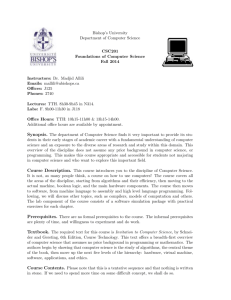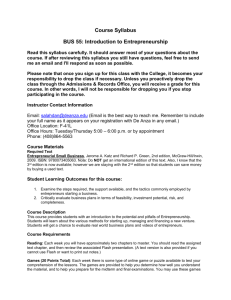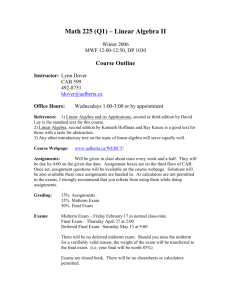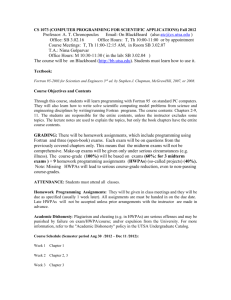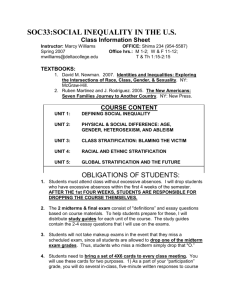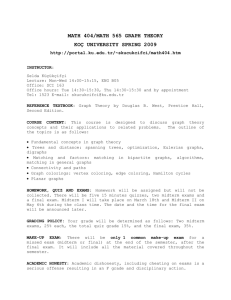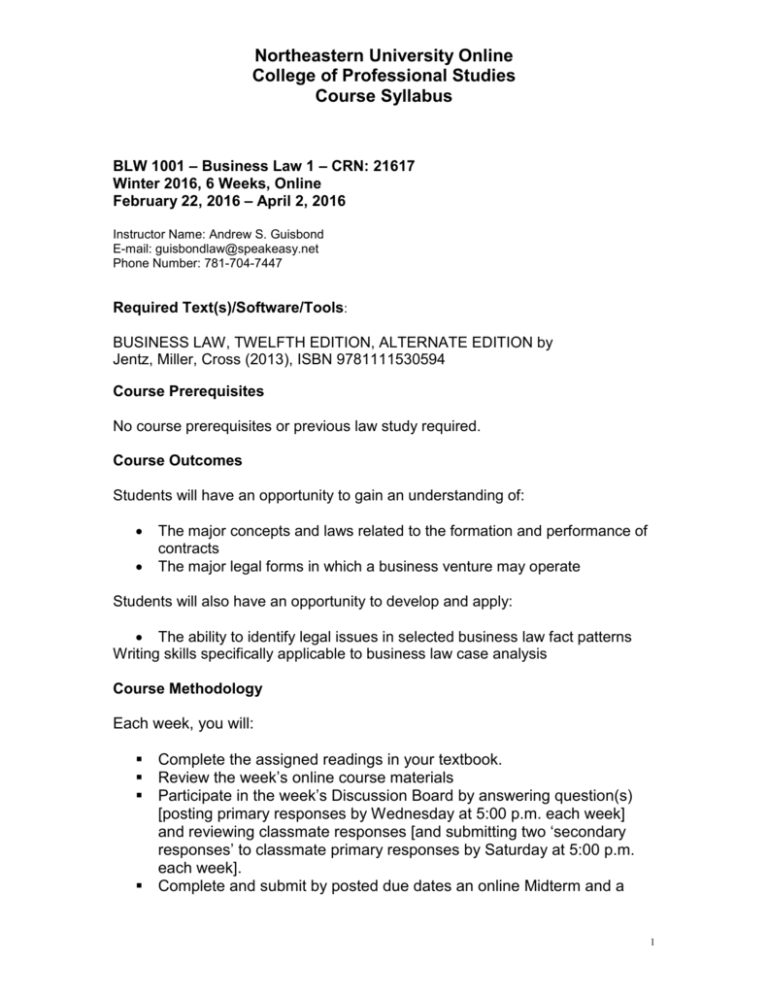
Northeastern University Online
College of Professional Studies
Course Syllabus
BLW 1001 – Business Law 1 – CRN: 21617
Winter 2016, 6 Weeks, Online
February 22, 2016 – April 2, 2016
Instructor Name: Andrew S. Guisbond
E-mail: guisbondlaw@speakeasy.net
Phone Number: 781-704-7447
Required Text(s)/Software/Tools:
BUSINESS LAW, TWELFTH EDITION, ALTERNATE EDITION by
Jentz, Miller, Cross (2013), ISBN 9781111530594
Course Prerequisites
No course prerequisites or previous law study required.
Course Outcomes
Students will have an opportunity to gain an understanding of:
The major concepts and laws related to the formation and performance of
contracts
The major legal forms in which a business venture may operate
Students will also have an opportunity to develop and apply:
The ability to identify legal issues in selected business law fact patterns
Writing skills specifically applicable to business law case analysis
Course Methodology
Each week, you will:
Complete the assigned readings in your textbook.
Review the week’s online course materials
Participate in the week’s Discussion Board by answering question(s)
[posting primary responses by Wednesday at 5:00 p.m. each week]
and reviewing classmate responses [and submitting two ‘secondary
responses’ to classmate primary responses by Saturday at 5:00 p.m.
each week].
Complete and submit by posted due dates an online Midterm and a
1
Final Exam.
Submit clear and law supported written Discussion Board posts, [and
during exam periods] Midterm Exam and Final Exam answers.
Attendance Policy and Discussion Board Participation
Each week students must post a least one ‘primary response’ (by
answering posted Discussion Board question(s) for the week) and two
‘secondary responses’ (responses to classmate answers or posts)
Timely completion of Discussion Board assignments will be assigned
30% of final course grade. Any/each late Discussion Board
assignment(s) will receive 1/2 credit.
Primary responses are due by 5:00 p.m. each Wednesday and
secondary responses by 5:00 p.m. each Saturday
Responses should include arguments or positions supported by
specific references and citation(s) to rule(s) of law [not personal
opinions] and should be between 200 and 300 words [per each primary
and per each secondary response]
Communication/Submission of Work
You will complete and post weekly Discussion Board assignments, a Midterm
Exam, and a Final Exam, all online through our course site.
Please do not email Discussion Board assignments. Please submit all exam
answers through our course site. Please save a copy of your exam answers
prior to submitting your answers. Please do not email exam answers. Please
do not post exam answers to Discussion Board.
You will access exam grades and Instructor comments posted with your
grade online through our course site.
You will also receive and respond to emails from your Instructor.
Grading/Evaluation Standards
Evaluation will be based upon class attendance, completion of the online
Midterm Exam, an online Final Exam and timely completion of weekly
Discussion Board assignments as follows:
Midterm Exam
Final Exam
Discussion Board
35%
35%
30%
2
Any/each late Discussion Board assignment(s) will receive 1/2 credit. Exams
musts be completed during the announced exam period and missed exams
will be assigned a -0- value in the calculation of the final course grade.
The Midterm Exam will cover selected contract law issues. The Final Exam
will cover business organizations issues. Both exams will be ‘issue spotting’
essay type exams which will provide the student an opportunity to apply
concepts discussed in assigned reading and course materials to ‘fact
patterns’ provided in the exam questions.
This exam format will provide the student an opportunity to write about the
concepts they have learned in the course, applying these concepts to a
hypothetical fact pattern(s) or case(s).
You should approach the exams with the idea that most important to your
answers will be your explanation of the key rules of law from our reading
assignments and your arguments in support of your conclusion(s). The exams
will both be ‘open book.’
Exams are timed online exams. The exams will be available for at least six (6)
days and must be completed at any time during the exam period.
See also discussion of grading standards in the CPS Student Handbook, at
http://www.cps.neu.edu/student-services/student-handbook. All submitted
written work should be clear, comprehensible, and competently produced.
Class Schedule / Topical Outline
Week
Date
Topic
Assignments
Introduction to law and legal
concepts; Introduction to contract
concepts; Offer, acceptance and
agreement.
1
02/22/16
Overview: What is a ‘law’, brief
Chapters 1 -3 [skim]. Chapters
overview of the legal system and the 10 and 11.
course; elements of a contract; legal
issues with regard to offer and
acceptance, counteroffer and
rejection; the ‘meeting of the minds’
known as the ‘agreement.’
Consideration;
Capacity and legality
2
02/29/16
Chapters 12-13
Overview: The element of
3
consideration; definition of and types
of consideration; the party and
capacity elements of the contract.
Genuineness of assent; Statute of
Frauds; Performance and Discharge
3
03/07/16
Overview: Defenses to the formation Chapters 14, 15 and 17
of the agreement; issues related to
the requirements of a writing in
certain circumstances; completion
issues
Breach and Remedies; Uniform
Commercial Code and Warranties;
Midterm Exam [online]
4
03/14/16
Overview: Failure to perform; types
of damages and other remedies.
Contracts for the sale of goods;
types of warranties under the U.C.C.
Chapters 18, 19 and 22
Introduction to business
organizations; Sole proprietorships;
Franchises; Partnerships and
Limited Liability Partnerships.
5
03/21/16
Overview: Types of business forms;
Chapters 36, 37 and 38
the simplest form: formation,
ownership, management, and other
issues. Formation, ownership,
management, dissolution in
partnerships and comparison to sole
proprietorship form.
Corporations. Review and Exam
Preparation; Final Exam [online]
6
03/28/16
Overview: Formation and
management in the corporate form;
comparison to other forms.
Chapters 39 and 40
Class meets every week. The Midterm and Final Exams are online exams.
Academic Honesty and Integrity Statement
4
The University views academic dishonesty as one of the most serious offenses that a student can
commit while in college and imposes appropriate punitive sanctions on violators. Here are some
examples of academic dishonesty. While this is not an all-inclusive list, we hope this will help you
to understand some of the things instructors look for. The following is excerpted from the
University’s policy on academic honesty and integrity; the complete policy is available at
http://www.cps.neu.edu/about-cps/policies-and-procedures.
Cheating – intentionally using or attempting to use unauthorized materials, information or study
aids in an academic exercise. This may include use of unauthorized aids (notes, texts) or copying
from another student’s exam, paper, computer disk, etc.
Fabrication – intentional and unauthorized falsification, misrepresentation, or invention of any
data, or citation in an academic exercise. Examples may include making up data for a
research paper, altering the results of a lab experiment or survey, listing a citation for a
source not used, or stating an opinion as a scientifically proven fact.
Plagiarism – intentionally representing the words or ideas of another as one’s own in any
academic exercise without providing proper documentation by source by way of a footnote,
endnote or intertextual note.
Unauthorized collaboration – Students, each claiming sole authorship, submit separate
reports, which are substantially similar to one another. While several students may have the
same source material, the analysis, interpretation and reporting of the data must be each
individual’s.
Participation in academically dishonest activities – Examples include stealing an exam, using
a pre-written paper through mail order or other services, selling, loaning or otherwise
distributing materials for the purpose of cheating, plagiarism, or other academically dishonest
acts; alternation, theft, forgery, or destruction of the academic work of others.
Facilitating academic dishonesty – Examples may include inaccurately listing someone as coauthor of paper who did not contribute, sharing a take home exam, taking an exam or writing
a paper for another student.
Northeastern University Online Policies and Procedures
For comprehensive information please go to http://www.cps.neu.edu/online/
Northeastern University Online Copyright Statement
Northeastern University Online is a registered trademark of Northeastern University.
All other brand and product names are trademarks or registered trademarks of their respective
companies.
This course material is copyrighted and all rights are reserved by Northeastern University Online.
No part of this publication may be reproduced, transmitted, transcribed, stored in a retrieval
system, or translated into any language or computer language, in any form or by any means,
electronic, mechanical, magnetic, optical, chemical, manual, or otherwise, without the express
prior written permission of Northeastern University Online.
Copyright 2010 © by Northeastern University Online
All Rights Reserved
5



